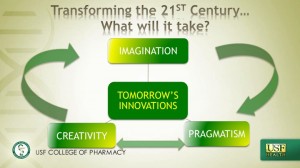I spent last week attending the FutureMed2013 conference hosted by Singularity University. It was a fantastic display of futuristic technologies by the innovative souls that believe the future of health will be tied to “disruptive health technologies!” I too believe this; mobile Health (mHealth) technologies promise to change the entire patient-provider relationship. These exponentially evolving technologies within medicine and healthcare will prove dizzying for some, welcomed by most, and scary for the rest. And yet, it cannot be stopped, only slowed by regulators that may not be able to keep up with the pace of the change, or health providers not accepting that their current practices will be forever altered. In any event change is coming, and I fully intend to bring this change back to the USF College Pharmacy!
Sewn into the optimistic fabric of mHealth is the belief that patients will accept these technologies, which may lead to a level of patient engagement in each patient’s own health status that has been evasive in this country for several decades. The goal ultimately is simple: have the patient gain empowerment and control of their health with constant reinforcement of their health status through the use of mHealth. And, overall improved health in our communities means lowering the costs associated with healthcare. The promise of improved community health may literally be in the palms of patients’ hands.
The use of mHealth is not without peril. A recently released report by the IMS Institue for Healthcare Informatics revealed that while there are major opportunities to advance mHealth technologies to augment patient care, the current state of mobile apps does not yet have the evidence or overall utility to provide meaningful health supports. Some of the identified deficits noted in the report include:
• More than 50 percent of all healthcare apps were downloaded fewer than 500 times –
• Current healthcare apps do not fit well with the greatest areas of spending within healthcare – specifically those patients facing multiple chronic diseases and typically over the age of 65.
• Physicians’ concerns included lack of scientific evidence that mobile apps improve overall health outcomes, concerns about security, and the ability to incorporate this information into a health information technology infrastructure.
My personal concern involves the development of informatics systems that can effectively harness all of this patient-generated information, and turn it into usable information for interprofessional health teams. There are ongoing plans with our USF Health Information Systems team to accomplish this goal. I am confident we can achieve this outcome.
I also foresee the possibility of bringing these technologies into underserved and underrepresented communities, which are often affected the most by lack of healthcare access. Putting these technologies into the hands of community health workers and other “health extenders”, with proper medical provider supports, could become an effective means of improving health disparities in many communities. Ultimately, poor health in any community is a drag on all communities. The public health impact holds so much promise with the implementation of these technologies.
We all claim to want to achieve true “Patient-Centered” care; our currently existing health systems do not provide an adequate platform to truly achieve this for the entire USA population. Interprofessional teams, including robust IT supports, will offer the best means of corralling the overwhelming data that mHealth can generate. Physicians, nurses, pharmacists, physician assistants, physicial therapists, and public health officials must all lock arms to create authentic patient-centered teams. There is no turning back these technologies; we must all embrace the future of mHealth…today!
